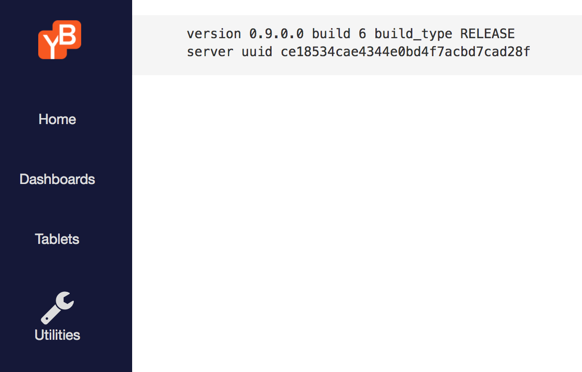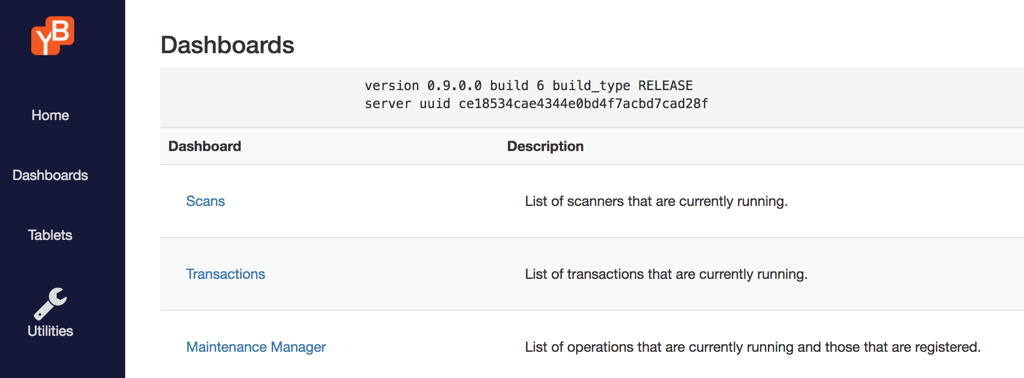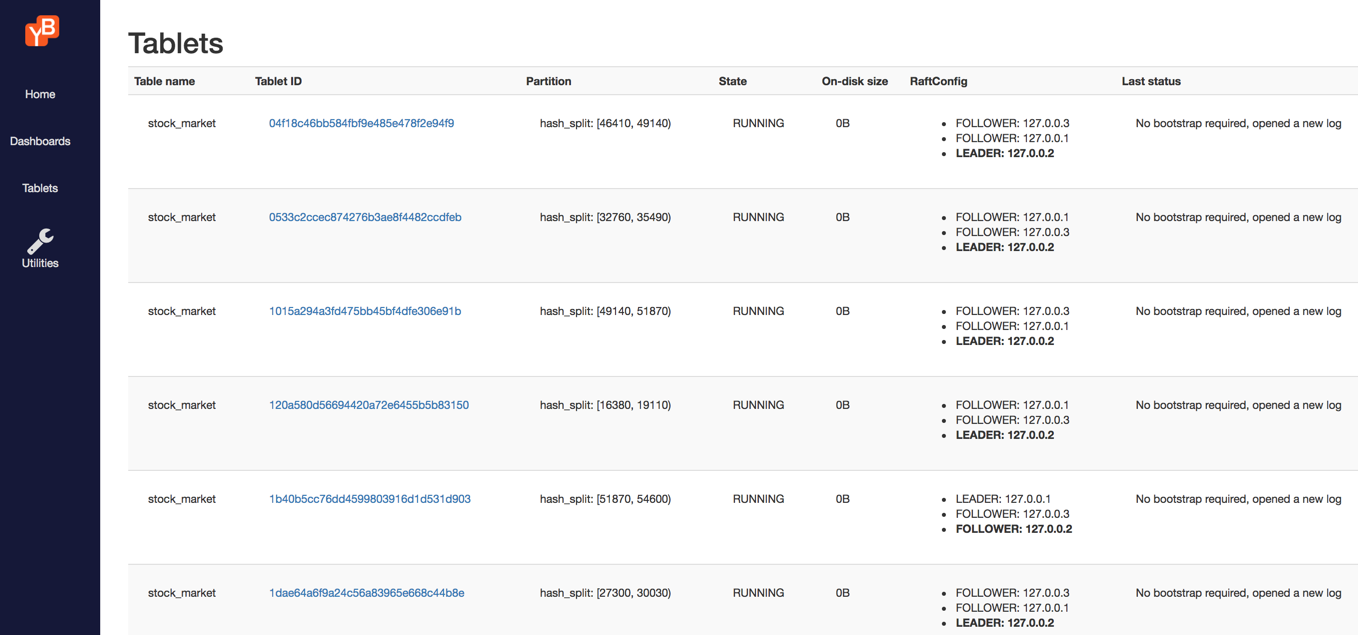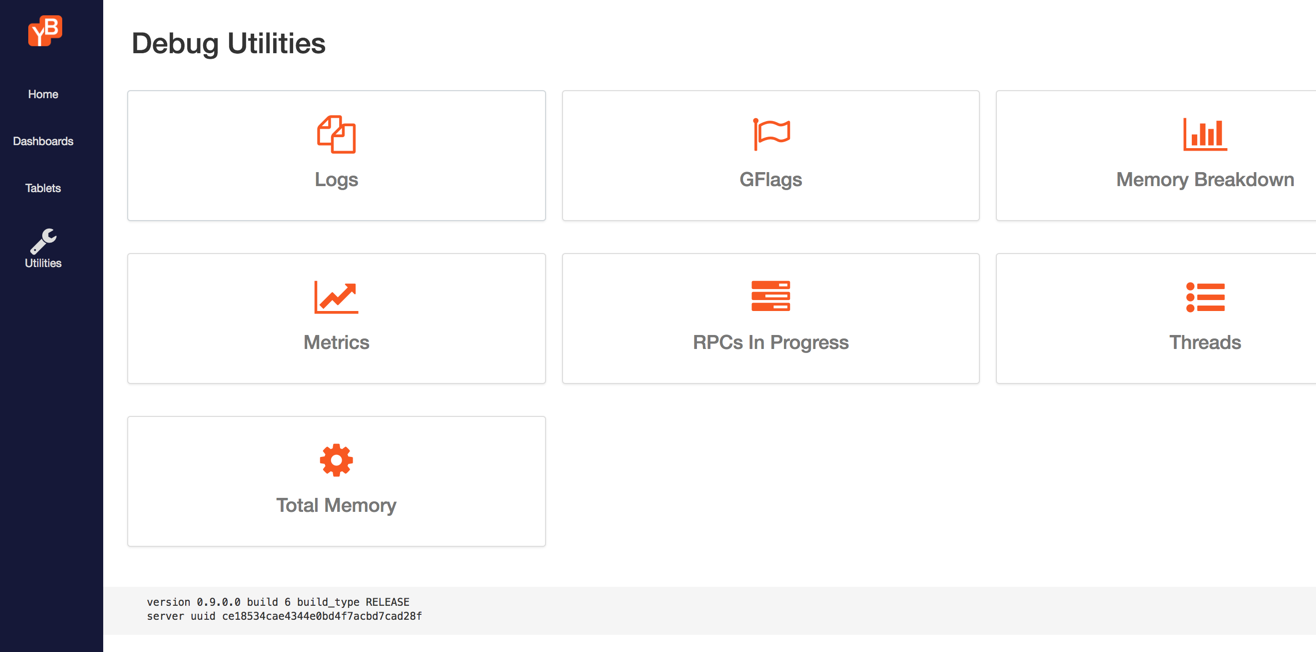yb-tserver
Use the yb-tserver binary and its flags to configure the YB-TServer server. The yb-tserver executable file is located in the bin directory of YugabyteDB home.
Syntax
yb-tserver [ flags ]
Example
$ ./bin/yb-tserver \
--tserver_master_addrs 172.151.17.130:7100,172.151.17.220:7100,172.151.17.140:7100 \
--rpc_bind_addresses 172.151.17.130 \
--start_pgsql_proxy \
--fs_data_dirs "/home/centos/disk1,/home/centos/disk2" &
Online help
To display the online help, run yb-tserver --help from the YugabyteDB home directory.
$ ./bin/yb-tserver --help
Configuration flags
- Help
- General
- Logging
- Raft
- Sharding
- Geo-distribution
- YSQL
- YCQL
- YEDIS
- Performance
- Security
- Change data capture (CDC)
Help flags
--help
Displays help on all flags.
--helpon
Displays help on modules named by the specified flag value.
General flags
--flagfile
Specifies the file to load the configuration flags from. The configuration flags must be in the same format as supported by the command line flags.
--version
Shows version and build info, then exits.
--tserver_master_addrs
Specifies a comma-separated list of all the yb-master RPC addresses.
Required.
Default: 127.0.0.1:7100
Note
The number of comma-separated values should match the total number of YB-Master servers (or the replication factor).--fs_data_dirs
Specifies a comma-separated list of mount directories, where yb-tserver will add a yb-data/tserver data directory, tserver.err, tserver.out, and pg_data directory.
Required.
--fs_wal_dirs
Specifies a comma-separated list of directories, where yb-tserver will store write-ahead (WAL) logs. This can be the same as one of the directories listed in --fs_data_dirs, but not a subdirectory of a data directory.
Default: Same value as --fs_data_dirs
--max_clock_skew_usec
Specifies the expected maximum clock skew, in microseconds (µs), between any two nodes in your deployment.
Default: 500000 (500,000 µs = 500ms)
--rpc_bind_addresses
Specifies the comma-separated list of the network interface addresses to bind to for RPC connections:
-
Typically, the value is set to the private IP address of the host on which the server is running. When using the default, or explicitly setting the value to
0.0.0.0:9100, the server will listen on all available network interfaces. -
The values must match on all
yb-masterandyb-tserverconfigurations.
Default: 0.0.0.0:9100
Note
In cases whererpc_bind_addresses is set to 0.0.0.0 (or not explicitly set, and uses the default) or in cases involving public IP addresses, make sure that server_broadcast_addresses is correctly set.
--server_broadcast_addresses
Specifies the public IP or DNS hostname of the server (with an optional port). This value is used by servers to communicate with one another, depending on the connection policy parameter.
Default: ""
--dns_cache_expiration_ms
Specifies the duration, in milliseconds, until a cached DNS resolution expires. When hostnames are used instead of IP addresses, a DNS resolver must be queried to match hostnames to IP addresses. By using a local DNS cache to temporarily store DNS lookups, DNS queries can be resolved quicker and additional queries can be avoided, thereby reducing latency, improving load times, and reducing bandwidth and CPU consumption.
Default: 60000 (1 minute)
Note
If this value is changed from the default, make sure to add the identical value to all YB-Master and YB-TSever configurations.--use_private_ip
Specifies the policy that determines when to use private IP addresses for inter-node communication. Possible values are never (default),zone,cloud and region. Based on the values of the placement (--placement_*) configuration flags.
Valid values for the policy are:
never— Always use the--server_broadcast_addresses.zone— Use the private IP inside a zone; use the--server_broadcast_addressesoutside the zone.region— Use the private IP address across all zone in a region; use--server_broadcast_addressesoutside the region.
Default: never
--webserver_interface
The address to bind for the web server user interface.
Default: 0.0.0.0 (127.0.0.1)
--webserver_port
The port for monitoring the web server.
Default: 9000
--webserver_doc_root
The monitoring web server home directory..
Default: The www directory in the YugabyteDB home directory.
Logging flags
--log_dir
The directory to write yb-tserver log files.
Default: Same as --fs_data_dirs
--logemaillevel
Email log messages logged at this level, or higher. Values: 0 (all), 1, 2, 3 (FATAL), 999 (none)
Default: 999
--logmailer
The mailer used to send logging email messages.
Default: "/bin/mail"
--logtostderr
Write log messages to stderr instead of logfiles.
Default: false
--max_log_size
The maximum log size, in megabytes (MB). A value of 0 will be silently overridden to 1.
Default: 1800 (1.8 GB)
--minloglevel
The minimum level to log messages. Values are: 0 (INFO), 1, 2, 3 (FATAL).
Default: 0 (INFO)
--stderrthreshold
Log messages at, or above, this level are copied to stderr in addition to log files.
Default: 2
--stop_logging_if_full_disk
Stop attempting to log to disk if the disk is full.
Default: false
Raft flags
Note
Ensure that values used for Raft and the write ahead log (WAL) inyb-tserver configurations match the values in yb-master configurations.
--follower_unavailable_considered_failed_sec
The duration, in seconds, after which a follower is considered to be failed because the leader has not received a heartbeat. The follower is then evicted from the configuration and the data is rereplicated elsewhere.
Default: 900 (15 minutes)
Important
The--follower_unavailable_considered_failed_sec value should match the value for --log_min_seconds_to_retain.
--leader_failure_max_missed_heartbeat_periods
The maximum heartbeat periods that the leader can fail to heartbeat in before the leader is considered to be failed. The total failure timeout, in milliseconds (ms), is --raft_heartbeat_interval_ms multiplied by --leader_failure_max_missed_heartbeat_periods.
For read replica clusters, set the value to 10 in all yb-tserver and yb-master configurations. Because the data is globally replicated, RPC latencies are higher. Use this flag to increase the failure detection interval in such a higher RPC latency deployment.
Default: 6
--max_stale_read_bound_time_ms
Specifies the maximum bounded staleness (duration), in milliseconds, before a follower forwards a read request to the leader. In a geo-distributed cluster, with followers located a long distance from the tablet leader, you can use this setting to increase the maximum bounded staleness.
Default: 10000 (10 seconds)
--raft_heartbeat_interval_ms
The heartbeat interval, in milliseconds (ms), for Raft replication. The leader produces heartbeats to followers at this interval. The followers expect a heartbeat at this interval and consider a leader to have failed if it misses several in a row.
Default: 500
Write ahead log (WAL) flags
Note
Ensure that values used for the write ahead log (WAL) inyb-tserver configurations match the values for yb-master configurations.
--fs_wal_dirs
The directory where the yb-tserver retains WAL files. May be the same as one of the directories listed in --fs_data_dirs, but not a subdirectory of a data directory.
Default: Same as --fs_data_dirs
--durable_wal_write
If set to false, the writes to the WAL are synced to disk every interval_durable_wal_write_ms milliseconds (ms) or every bytes_durable_wal_write_mb megabyte (MB), whichever comes first. This default setting is recommended only for multi-AZ or multi-region deployments where the availability zones (AZs) or regions are independent failure domains and there is not a risk of correlated power loss. For single AZ deployments, this flag should be set to true.
Default: false
--interval_durable_wal_write_ms
When --durable_wal_write is false, writes to the WAL are synced to disk every --interval_durable_wal_write_ms or --bytes_durable_wal_write_mb, whichever comes first.
Default: 1000
--bytes_durable_wal_write_mb
When --durable_wal_write is false, writes to the WAL are synced to disk every --bytes_durable_wal_write_mb or --interval_durable_wal_write_ms, whichever comes first.
Default: 1
--log_min_seconds_to_retain
The minimum duration, in seconds, to retain WAL segments, regardless of durability requirements. WAL segments can be retained for a longer amount of time, if they are necessary for correct restart. This value should be set long enough such that a tablet server which has temporarily failed can be restarted within the given time period.
Default: 900 (15 minutes)
--log_min_segments_to_retain
The minimum number of WAL segments (files) to retain, regardless of durability requirements. The value must be at least 1.
Default: 2
--log_segment_size_mb
The size, in megabytes (MB), of a WAL segment (file). When the WAL segment reaches the specified size, then a log rollover occurs and a new WAL segment file is created.
Default: 64
Sharding flags
--yb_num_shards_per_tserver
The number of shards per YB-TServer for each YCQL table when a user table is created.
Default: -1 (server internally sets default value). For servers with up to two CPU cores, the default value is 4. For three or more CPU cores, the default value is 8. Local cluster installations, created with yb-ctl and yb-docker-ctl, use a value of 2 for this flag. Clusters created with yugabyted use a default value of 1.
Important
This value must match on allyb-master and yb-tserver configurations of a YugabyteDB cluster.
Note
On a per-table basis, theCREATE TABLE ... WITH TABLETS = <num> clause can be used to override the yb_num_shards_per_tserver value.
--ysql_num_shards_per_tserver
The number of shards per YB-TServer for each YSQL table when a user table is created.
Default: -1 (server internally sets default value). For servers with up to two CPU cores, the default value is 2. For servers with three or four CPU cores, the default value is 4. Beyond four cores, the default value is 8. Local cluster installations, created with yb-ctl and yb-docker-ctl, use a value of 2 for this flag. Clusters created with yugabyted use a default value of 1.
Important
This value must match on allyb-master and yb-tserver configurations of a YugabyteDB cluster.
Note
On a per-table basis, theCREATE TABLE ...SPLIT INTO clause can be used to override the ysql_num_shards_per_tserver value.
Geo-distribution flags
Settings related to managing geo-distributed clusters.
--placement_zone
The name of the availability zone, or rack, where this instance is deployed.
Default: rack1
--placement_region
Specifies the name of the region, or data center, where this instance is deployed.
Default: datacenter1
--placement_cloud
Specifies the name of the cloud where this instance is deployed.
Default: cloud1
--placement_uuid
The unique identifier for the cluster.
Default: ""
--force_global_transactions
If true, forces all transactions through this instance to always be global transactions that use the system.transactions transaction status table. This is equivalent to always setting the session variable force_global_transaction = TRUE (see Row-Level Geo-Partitioning).
Global transaction latency
Avoid setting this flag when possible. All distributed transactions can run without issue as global transactions, but you may have significantly higher latency when committing transactions, because YugabyteDB must achieve consensus across multiple regions to write tosystem.transactions. When necessary, it is preferable to selectively set the session variable force_global_transaction = TRUE rather than setting this flag.
Default: false
YSQL flags
The following flags support the use of the YSQL API.
--enable_ysql
Enables the YSQL API. Replaces the deprecated --start_pgsql_proxy flag.
Default: true
--ysql_enable_auth
Enables YSQL authentication.
Note
Release 2.0: Assign a password for the default yugabyte user to be able to sign in after enabling YSQL authentication.
Release 2.0.1: When YSQL authentication is enabled, you can sign into ysqlsh using the default yugabyte user that has a default password of yugabyte.
Default: false
--pgsql_proxy_bind_address
Specifies the TCP/IP bind addresses for the YSQL API. The default value of 0.0.0.0:5433 allows listening for all IPv4 addresses access to localhost on port 5433. The --pgsql_proxy_bind_address value overwrites listen_addresses (default value of 127.0.0.1:5433) that controls which interfaces accept connection attempts.
To specify fine-grained access control over who can access the server, use --ysql_hba_conf.
Default: 0.0.0.0:5433
--pgsql_proxy_webserver_port
Specifies the web server port for YSQL metrics monitoring.
Default: 13000
--ysql_hba_conf
Note
--ysql_hba_conf tserver flag is deprecated. Use --ysql_hba_conf_csv instead.
Specifies a comma-separated list of PostgreSQL client authentication settings that is written to the ysql_hba.conf file.
For details on using --ysql_hba_conf to specify client authentication, see Host-based authentication.
Default: "host all all 0.0.0.0/0 trust,host all all ::0/0 trust"
To see the current values in the ysql_hba.conf file, run the SHOW hba_file; statement and then view the file. Because the file is autogenerated, direct edits are overwritten by the autogenerated content.
--ysql_hba_conf_csv
Specifies a comma-separated list of PostgreSQL client authentication settings that is written to the ysql_hba.conf file. When writing, the rules are:
- in case text has
,or"it should be quoted with" - the
"symbol inside quoted text should be doubled (i.e."")
Example:
Suppose we have two fields: host all all 127.0.0.1/0 password and host all all 0.0.0.0/0 ldap ldapserver=***** ldapsearchattribute=cn ldapport=3268 ldapbinddn=***** ldapbindpasswd="*****".
The second field has the " symbol, so we should quote this field and double the quotes. The result will be:
"host all all 0.0.0.0/0 ldap ldapserver=***** ldapsearchattribute=cn ldapport=3268 ldapbinddn=***** ldapbindpasswd=""*****"""
Now the fields can be joined with the , and the final flag value is set inside ' single quotes:
--ysql_hba_conf_csv='host all all 127.0.0.1/0 password,"host all all 0.0.0.0/0 ldap ldapserver=***** ldapsearchattribute=cn ldapport=3268 ldapbinddn=***** ldapbindpasswd=""*****"""'
For details on using --ysql_hba_conf_csv to specify client authentication, see Host-based authentication.
Default: "host all all 0.0.0.0/0 trust,host all all ::0/0 trust"
To see the current values in the ysql_hba.conf file, run the SHOW hba_file; statement and then view the file. Because the file is autogenerated, direct edits are overwritten by the autogenerated content.
--ysql_pg_conf
Comma-separated list of PostgreSQL setting assignments.
--ysql_timezone
Specifies the time zone for displaying and interpreting timestamps.
Default: Uses the YSQL time zone.
--ysql_datestyle
Specifies the display format for data and time values.
Default: Uses the YSQL display format.
--ysql_max_connections
Specifies the maximum number of concurrent YSQL connections.
Default: 300
--ysql_default_transaction_isolation
Specifies the default transaction isolation level.
Valid values: SERIALIZABLE, REPEATABLE READ, READ COMMITTED, and READ UNCOMMITTED.
Default: READ COMMITTED$
$ Read Committed Isolation is supported only if the gflag yb_enable_read_committed_isolation is set to true. By default this gflag is false and in this case the Read Committed isolation level of Yugabyte's transactional layer falls back to the stricter Snapshot Isolation (in which case READ COMMITTED and READ UNCOMMITTED of YSQL also in turn use Snapshot Isolation).
--ysql_disable_index_backfill
Set this flag to false to enable online index backfill. When set to false, online index builds run while online, without failing other concurrent writes and traffic.
For details on how online index backfill works, see the Online Index Backfill design document.
Default: false
--ysql_sequence_cache_minval
Specify the minimum number of sequence values to cache in the client for every sequence object.
To turn off the default size of cache flag, set the flag to 0.
For details on the expected behaviour when used with the sequence cache clause, see the semantics under CREATE SEQUENCE and ALTER SEQUENCE pages.
Default: 100
--ysql_log_statement
Specifies the types of YSQL statements that should be logged.
Valid values: none (off), ddl (only data definition queries, such as create/alter/drop), mod (all modifying/write statements, includes DDLs plus insert/update/delete/trunctate, etc), and all (all statements).
Default: none
--ysql_log_min_duration_statement
Logs the duration of each completed SQL statement that runs the specified duration (in milliseconds) or longer. Setting the value to 0 prints all statement durations. You can use this flag to help track down unoptimized (or "slow") queries.
Default: -1 (disables logging statement durations)
--ysql_log_min_messages
Specifies the lowest YSQL message level to log.
YCQL flags
The following flags support the use of the YCQL API.
--use_cassandra_authentication
Specify true to enable YCQL authentication (username and password), enable YCQL security statements (CREATE ROLE, DROP ROLE, GRANT ROLE, REVOKE ROLE, GRANT PERMISSION, and REVOKE PERMISSION), and enforce permissions for YCQL statements.
Default: false
--cql_proxy_bind_address
Specifies the bind address for the YCQL API.
Default: 0.0.0.0:9042 (127.0.0.1:9042)
--cql_proxy_webserver_port
Specifies the port for monitoring YCQL metrics.
Default: 12000
--cql_table_is_transactional_by_default
Specifies if YCQL tables are created with transactions enabled by default.
Default: false
--ycql_disable_index_backfill
Set this flag to false to enable online index backfill. When set to false, online index builds run while online, without failing other concurrent writes and traffic.
For details on how online index backfill works, see the Online Index Backfill design document.
Default: true
--ycql_require_drop_privs_for_truncate
Set this flag to true to reject TRUNCATE statements unless allowed by DROP TABLE privileges.
Default: false
--ycql_enable_audit_log
Set this flag to true to enable audit logging for the universe.
For details, see Audit logging for the YCQL API.
YEDIS flags
The following flags support the use of the YEDIS API.
--redis_proxy_bind_address
Specifies the bind address for the YEDIS API.
Default: 0.0.0.0:6379
--redis_proxy_webserver_port
Specifies the port for monitoring YEDIS metrics.
Default: 11000
Performance flags
--enable_ondisk_compression
Enable Snappy compression at the cluster level.
Default: true
--regular_tablets_data_block_key_value_encoding
Key-value encoding to use for regular data blocks in RocksDB. Possible options: shared_prefix, three_shared_parts.
Default: shared_prefix
Note
Only change this flag tothree_shared_parts after you migrate the whole cluster to the YugabyteDB version that supports it.
--rocksdb_compact_flush_rate_limit_bytes_per_sec
Used to control rate of memstore flush and SSTable file compaction.
Default: 256MB
--rocksdb_universal_compaction_min_merge_width
Compactions run only if there are at least rocksdb_universal_compaction_min_merge_width eligible files and their running total (summation of size of files considered so far) is within rocksdb_universal_compaction_size_ratio of the next file in consideration to be included into the same compaction.
Default: 4
--rocksdb_universal_compaction_size_ratio
Compactions run only if there are at least rocksdb_universal_compaction_min_merge_width eligible files and their running total (summation of size of files considered so far) is within rocksdb_universal_compaction_size_ratio of the next file in consideration to be included into the same compaction.
Default: 20
--timestamp_history_retention_interval_sec
The time interval, in seconds, to retain history/older versions of data. Point-in-time reads at a hybrid time prior to this interval might not be allowed after a compaction and return a Snapshot too old error. Set this to be greater than the expected maximum duration of any single transaction in your application.
Default: 900
--remote_bootstrap_rate_limit_bytes_per_sec
Rate control across all tablets being remote bootstrapped from or to this process.
Default: 256MB
Network compression
Use the following two gflags to configure RPC compression:
--enable_stream_compression
Controls whether YugabyteDB uses RPC compression. Valid values are true or false.
--stream_compression_algo
Specifies which compression algorithm to use. Requires enable_stream_compression to be set to true. Valid values are:
- 0: No compression (default value)
- 1: Gzip
- 2: Snappy
- 3: LZ4
In most cases, LZ4 (--stream_compression_algo=3) offers the best compromise of compression performance versus CPU overhead.
Upgrade notes
To upgrade from an older version that doesn't support RPC compression (such as 2.4), to a newer version that does (such as 2.6), you need to do the following:
-
Rolling restart to upgrade YugabyteDB to a version that supports compression.
-
Rolling restart to enable compression, on both master and tserver, by setting
enable_stream_compression=true.
Note You can omit this step if the version you're upgrading to already has compression enabled by default. For the stable release series, versions from 2.6.3.0 and above (including all 2.8 releases) haveenable_stream_compressionset to true by default. For the latest release series, this is all releases beyond 2.9.0. -
Rolling restart to set the compression algorithm to use, on both master and tserver, such as by setting
stream_compression_algo=3.
Security flags
For details on enabling client-server encryption, see Client-server encryption.
--certs_dir
Directory that contains certificate authority, private key, and certificates for this server.
Default: "" (Uses <data drive>/yb-data/tserver/data/certs.)
--allow_insecure_connections
Allow insecure connections. Set to false to prevent any process with unencrypted communication from joining a cluster. Note that this flag requires the use_node_to_node_encryption to be enabled and use_client_to_server_encryption to be enabled.
Default: true
--certs_for_client_dir
The directory that contains certificate authority, private key, and certificates for this server that should be used for client-to-server communications.
Default: "" (Use the same directory as for server-to-server communications.)
--dump_certificate_entries
Adds certificate entries, including IP addresses and hostnames, to log for handshake error messages. Enabling this flag is useful for debugging certificate issues.
Default: false
--use_client_to_server_encryption
Use client-to-server, or client-server, encryption with YCQL.
Default: false
--use_node_to_node_encryption
Enable server-server, or node-to-node, encryption between YugabyteDB YB-Master and YB-TServer servers in a cluster or universe. To work properly, all YB-Master servers must also have their --use_node_to_node_encryption setting enabled. When enabled, then --allow_insecure_connections must be disabled.
Default: false
--cipher_list
Specify cipher lists for TLS 1.2 and below. (For TLS 1.3, use --ciphersuite.) Use a colon (":") separated list of TLSv1.2 cipher names in order of preference. Use an exclamation mark ("!") to exclude ciphers. For example:
--cipher_list DEFAULTS:!DES:!IDEA:!3DES:!RC2
This allows all ciphers for TLS 1.2 to be accepted, except those matching the category of ciphers omitted.
This flag requires a restart or rolling restart.
Default: DEFAULTS
For more information, refer to SSL_CTX_set_cipher_list in the OpenSSL documentation.
--ciphersuite
Specify cipher lists for TLS 1.3. (For TLS 1.2 and below, use --cipher_list.)
Use a colon (":") separated list of TLSv1.3 ciphersuite names in order of preference. Use an exclamation mark ("!") to exclude ciphers. For example:
--ciphersuite DEFAULTS:!CHACHA20
This allows all ciphersuites for TLS 1.3 to be accepted, except CHACHA20 ciphers.
This flag requires a restart or rolling restart.
Default: DEFAULTS
For more information, refer to SSL_CTX_set_cipher_list in the OpenSSL documentation.
Change data capture (CDC) flags
To learn about CDC, see Change data capture (CDC).
--cdc_rpc_timeout_ms
The timeout used for CDC->yb-tserver asynchronous RPC calls.
Default: 30000
--cdc_state_checkpoint_update_interval_ms
The rate at which CDC state's checkpoint is updated.
Default: 15000
--cdc_ybclient_reactor_threads
The number of reactor threads to be used for processing ybclient requests for CDC.
Default: 50
Admin UI
The Admin UI for the YB-TServer is available at http://localhost:9000.
Home
Home page of the YB-TServer (yb-tserver) that gives a high level overview of this specific instance.

Dashboards
Here's a list of all dashboards to review the ongoing operations:

Tablets
List of all tablets managed by this specific instance, sorted by the table name.

Debug
List of all utilities available to debug the performance of this specific instance.
